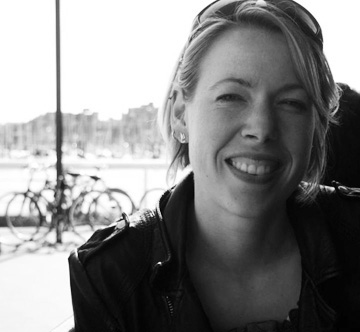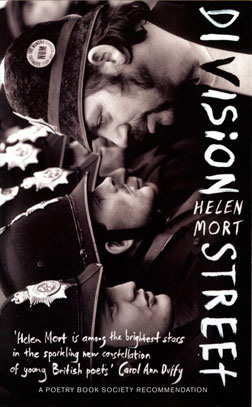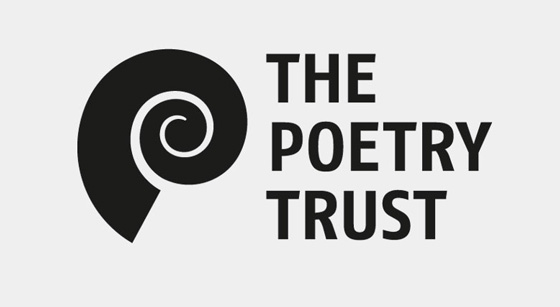Fenton Aldeburgh First Collection Prize 2014 – Winner Announced
The winner of the Fenton Aldeburgh First Collection Prize 2014 – one of the most significant and long-established poetry awards in the UK – was announced at the opening of the 26th Aldeburgh Poetry Festival on Friday 7 November 2014.
From a shortlist of five outstanding titles, the three judges (Imtiaz Dharker, Robert Seatter and Anthony Wilson) unanimously agreed that the prize should go to Helen Mort for Division Street which is published in the UK by Chatto & Windus.

Photographer: Andrew Marshall
Winning this year’s Fenton Aldeburgh First Collection Prize feels like a natural achievement for Helen Mort who has already benefited from The Poetry Trust’s talent development programmes. In 2009, she was one of eight up-and-coming poets selected for the highly-competitive Aldeburgh Advanced Seminar residential course in Suffolk; and in 2011 she took part in a ‘New Voices’ event at Aldeburgh Poetry Festival.
Responding to the news of her win, Helen said:
“Aldeburgh is a place I’ve always held dear – it was one of the first poetry festivals I ever went to and I fell in love with the location and atmosphere. The first time I attended, I was manning a stall on the main stage and listened to all the headline poets with a mixture of awe and exhilaration, never imagining I’d be one of them. And the chance to enjoy a week’s protected writing time in Aldeburgh is much needed too. After you’ve written a first book, you crave time and space to return to the things that got you writing in the first place. So the Prize is not only recognition for my first book but a new start for my next project. I’m thrilled.”
Parisa Ebrahimi – Poetry Editor at Chatto & Windus and publisher of Division Street – writes:
“This is a wonderful moment for Division Street, and for Helen, who is the first ever Chatto poet to be awarded this prize. It is a fitting honour for a poet whose work will continue to grow in range and reach.”
The judges commented as follows:
“Helen Mort negotiates Division Street with the skill of a tightrope walker. This is a poet taking finely-calculated risks with language, putting her life and times on the line, using every ounce of craft to balance on precarious edges.” Imtiaz Dharker
“Division Street has it all: range and ambition, consistency of standard (no poem feels like a filler!), musicality and toughness, and poems that really address the here and now, while strangely seeming always to have been there – such a rightness and a deftness in her voice.” Robert Seatter (Chair)
“On every page there is music, toughness twined with tenderness, and always an amazing sense of control. Division Street is properly and richly ambitious, speaking to culture nowin a way that is both eerily prescient (‘Seven Decapitations’) and a mirror to what has been lost (‘Scab’, ‘Pit Closure as a Tarantino Short’). That the book achieves this so consistently, and on so many levels – personal, psychological, historical – without ever sounding less than natural is a cause for celebration.” Anthony Wilson
Now in its third year of generous funding by The Fenton Arts Trust, and with further three-year support agreed, the Fenton Aldeburgh First Collection Prize is valuable not simply as a cash prize – £2,500 – but also for its emphasis on developing talent. Uniquely, the winner also receives a week of ‘protected’ writing time on the inspirational Suffolk coast and – most significantly – an invitation to read at the subsequent Aldeburgh Poetry Festival, thereby reaching the UK’s largest and most dedicated contemporary poetry audience. No other poetry prize offers such sustained investment and support.
For further information, email The Poetry Trust or telephone 01986 835950.
–
Notes:
1. Poem from Division Street (Chatto & Windus) by Helen Mort
Carnation
They’ve built a Body Shop
in the old butchers’ district –
caul and pig skin giving way
to coconut oil, jojoba,
as if the cloying air
should remind us
there’s no such thing
as a simple kindness –
like the spring carnations
fetched from the earth to market stall
and while you wait, beheaded
for your buttonhole.
2. The Aldeburgh First Collection Prize, established in 1989, was the first UK award designed to recognise and benefit a poet at first book stage. With six-year funding from The Fenton Arts Trust for 2012–2017, the prize is now titled The Fenton Aldeburgh First Collection Prize. Previous winners include Dan O’Brien (2013), Nick Laird (2005), Colette Bryce (2000) and Robin Robertson (1997).
3. The judges for the 2014 Fenton Aldeburgh First Collection Prize were Robert Seatter (Chair), Imtiaz Dharker and Anthony Wilson. Their 2014 Shortlist comprised:
- Bright Travellers • Fiona Benson (Cape Poetry)
- Moontide • Niall Campbell (Bloodaxe Books)
- My Family and Other Superheroes • Jonathan Edwards (Seren Books)
- Division Street • Helen Mort (Chatto & Windus)
- Self-Portrait with the Happiness • David Tait (Smith/Doorstop Book)
Bright Travellers and Moontide were also on the shortlist for the Forward Best First Collection (won by Liz Berry’s Black Country which, because of its publication date, is eligible for the 2015 Fenton Aldeburgh First Collection Prize).
Comments by all three judges on all the shortlisted books are at the end of this document.
4. The Fenton Arts Trust was founded in 1989 and seeks to assist individuals and organisations who are contributing to the artistic and cultural life of the UK, in particular supporting artists at the beginning of their careers. www.fentonartstrust.org.uk
5. The 26th Aldeburgh Poetry Festival takes place 7th – 9th November 2014. 30 poets from 12 countries in 60 events spread across nine venues in Aldeburgh and at Snape. Full programme available at www.thepoetrytrust.org
6. To arrange an interview with the 2014 winner Helen Mort, the director of The Poetry Trust Naomi Jaffa, a member of the judging panel or a short-listed poet, contact The Poetry Trust on 01986 835950 or by email

FENTON ALDEBURGH FIRST COLLECTION PRIZE 2014
JUDGES COMMENTS ON ALL THE SHORTLISTED BOOKS
IMTIAZ DHARKER
The short-listed collections are so different they could belong to five different worlds and yet each one sends up a flare that illuminates our times.
All of Fiona Benson’s Bright Travellers struggle to seed and flower, come to life out of arid beginnings, survive against great odds, or not. Against the currents of anxiety, danger and violence, these lives are given the tender attention of language which raises them towards the miraculous, ‘in a wind that knows we are mortal, porous,/a beautiful trick of the light’.
Niall Campbell’s poems live in the half-light between myth and the Moontide of the Hebridean islands where ‘the shadow casts out longer than the man’. This is spare writing, crafted to fit the solitude in the winter landscapes of the islands, their drowned wondering ‘whether they are now more moon than earth’.
David Tait’s Self-Portrait with the Happiness moves with great skill from Lakeland Fells to the ‘hefty rain’ in Guangzhou, from a sonnet written in the snow to phones that ‘rattled our pockets with voicemails’. While he holds nothing back in these poems of love, not-love and longing, the writing is precise and controlled, the tone starkly believable.
Jonathan Edwards’ My Family and Other Superheroes made me laugh out loud one minute and knocked me sideways with its beauty and honesty the next. This book reminded me that there is no substitute for finding the true voice, the experience that no-one else has lived or felt or had the heart to express in quite that way. This poet is an original, and I can’t wait to hear him read.
ROBERT SEATTER (CHAIR)
We loved and applauded Jonathan Edwards’ touching and humorous portrayal of Welshness (so hard to write well about affection, but he did it!); the muscular and wry lyricism of Helen Mort’s book bridging both the personal and the political; Fiona Benson’s deft probing of the darker side of the inner life; the authentic and charged world picture of Niall Campbell’s collection; and the precarious shifts and surprises of David Tait’s heart-delighting book.
ANTHONY WILSON
On the basis of these five first collections, there is no reason to assume the careers of the poets who wrote them will be anything other than long, ambitious, and very fruitful. Tackling emotionally complex, often difficult material with honesty, directness and supreme technical control, each of them presents, opens up and navigates fully realised universes which give insight into what it is like to be alive in these islands at the start of the 21st century.
The ‘sintered, nuclear core’ of Fiona Benson‘s Bright Travellers is the body, from prehistoric fertility symbols and Van Gogh’s bandaged ear to the rawness of miscarriage and childbirth. It is a book of griefs and miracles, circling again and again the question of what it means to be creative, and how we overcome the barriers that might prevent us achieving it. Bright Travellers weaves history, myth and landscape into a personal cry of gratitude for ‘the marvellous elsewhere’.
The central metaphors of Niall Campbell‘s Moontide are that of the singer and the song: ‘Am I some whistling ferryman,/ trailing my pen hand in the wake?’ It is a book of stories, and stories about stories, beached whales, late whiskies, and messages in bottles which ‘sink/ between the pier and the breakwater’. The book celebrates, ‘allows’ and answers all the songs it encompasses: ‘day song, dusk song and night;/ the boatmen’s tunes, the Spanish elegies.’
Jonathan Edwards‘s My Family and Other Superheroes walks that most difficult of poetic tightropes: the heartfelt memoir of family which dares to be both tender and funny. The titles alone are to die for: ‘Evel Knievel Jumps Over my Family’; ‘Gregory Peck and Sophia Loren in Crumlin for the Filming of Arabesque, June 1965’; ‘Half-time, Wales vs. Germany, Cardiff Arms Park, 1991’. Edwards has a fine way with set-piece forms which do not read like forms – and an even finer way with endings, pulling the rug from under the reader’s feet with surprise and delight.
‘What can we offer but love – / love and wonder’ is the question which permeates the poems of David Tait’s Self-Portrait with The Happiness. This is a book which merges self-awareness with undisguised frankness (‘As for beauty: I think I’ve experienced/ that moment in life that will flash/ before me at the end’) on the ‘hammerthrow’ of falling in love. Familiar with both midnight and the ‘cool gloom’ of dawn, Self-Portrait transforms those liminal spaces we all pass through – cigarettes at dawn, roadside lay-bys, the Gare du Nord, broken down cars and launderettes – into something strange and sacred.
—










